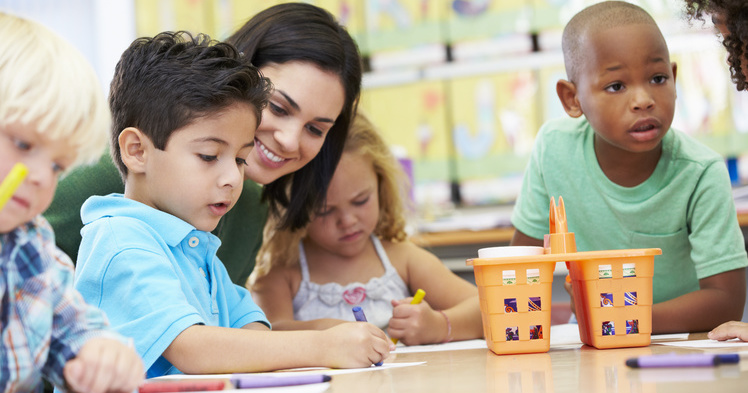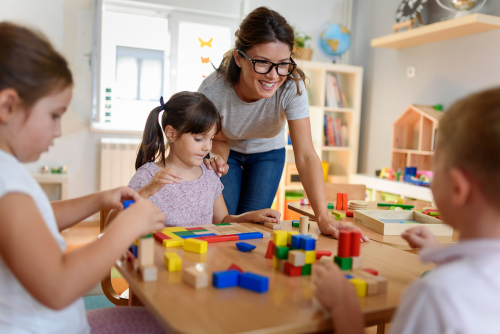The Function of Daycare in Cultivating Your Young child's Cognitive and psychological Abilities Through Organized Play and
The duty of day care in nurturing a young child's cognitive and emotional growth is often taken too lightly, yet it works as a crucial environment for organized play and instructional activities. With meticulously made experiences and communications, caretakers assist in necessary abilities such as emotional awareness and problem-solving. These foundational elements not only enhance a child's capability to attach with peers but additionally foster resilience and versatility in numerous situations. Recognizing the subtleties of how these characteristics unravel increases vital inquiries regarding the lasting effect of very early daycare experiences on personal development and social combination. What might that suggest for future advancement?
Significance of Structured Play
Structured play is an important element of young child development, as it offers a structure whereby youngsters can engage in meaningful communications and discovering experiences. This sort of play is intentionally designed to cultivate various developmental abilities, such as cognitive, social, and physical capabilities. By joining structured activities, kids learn to follow regulations, take turns, and work together with peers, every one of which are crucial for their interpersonal skills.

Moreover, structured play frequently incorporates instructional components, such as counting, shade acknowledgment, and language advancement, flawlessly incorporating finding out into fun activities. This method not only catches kids' attention yet likewise enhances vital principles in a delightful fashion. In general, structured play is crucial in advertising a balanced development, outfitting toddlers with the fundamental skills necessary for future knowing and social communications.
Emotional Growth in Childcare
Day care atmospheres play an essential role in cultivating psychological development in kids. These settings give youngsters with possibilities to communicate with peers and caregivers, promoting the advancement of vital social-emotional skills. Via normal interactions, toddlers discover to identify and express their feelings, such as sadness, aggravation, or joy, which is crucial for their psychological maturation.

Additionally, the structured environment of day care enables youngsters to experience a selection of emotions in a risk-free area. They discover to take care of feelings of separation anxiousness when transitioning from home to daycare and create resilience as they navigate brand-new partnerships and experiences. On the whole, the emotional advancement fostered in daycare not just advantages young children throughout their developmental years but likewise lays the foundation for healthy and balanced interpersonal relationships and psychological wellness throughout their lives.
Cognitive Abilities Via Activities
With engaging in a variety of tasks, kids in childcare setups can considerably improve their cognitive skills. Structured play and academic jobs are vital in advertising cognitive development, as they supply possibilities for exploration, analytical, and vital thinking. Activities such as puzzles, structure blocks, and memory video games test young children to assume creatively and practically, promoting important abilities like spatial recognition and pattern recognition.
In addition, interactive storytime sessions urge language growth and understanding. By listening to stories, young children find out to refine details and involve their creative imaginations, which boosts their narrative abilities and vocabulary. In addition, hands-on tasks including crafts and arts stimulate great electric motor abilities while also encouraging self-expression and creative thinking.
Sensory play, such as sand or water tasks, allows young children to trying out various textures and products, advertising inquiry-based discovering. These experiences not only enhance cognitive capacities yet also instill a view sense of interest regarding the world around them - infant daycare near me. Generally, the varied array of cognitive activities given in daycare settings plays a crucial duty in shaping a kid's capability to believe critically, fix issues, and involve meaningfully with their surroundings
Social Links and Interaction
In a nurturing environment, young children normally build social connections and participate in communications that are important for their social and emotional development. Daycare setups give an one-of-a-kind chance for kids to interact with peers, fostering important social abilities such as sharing, teamwork, and conflict resolution. These interactions aid toddlers find out to navigate their feelings and recognize the point of views of others, which are important parts of psychological knowledge.
Via structured play and team activities, kids are encouraged to communicate their feelings and ideas, enhancing their verbal abilities and advertising compassion. Engaging with peers also introduces them to diverse social norms and habits, enhancing their understanding of social dynamics. Furthermore, constant interaction with various other children assists to construct a feeling of community, giving an assistance system that is advantageous for emotional development.
As toddlers take part in collective tasks, they find out the value of perseverance, settlement, and team effort. These foundational social abilities are critical as they prepare for future partnerships, both in academic settings and beyond. Ultimately, the social connections created in day care play a significant function in shaping a kid's capability to engage positively and properly with others throughout their lives.
Duty of Caretakers in Growth

Caretakers play a pivotal role in cultivating kid advancement, specifically in the context of the social communications they experience in day care settings. These experts provide a caring atmosphere where toddlers can discover their emotions and cognitive capabilities via structured play and . By engaging in significant discussions, caretakers sustain language growth and enhance social skills.
Additionally, caretakers design appropriate habits and psychological responses, assisting kids find out empathy and dispute resolution. Their presence additionally produces a complacency, which is important for kids to with confidence discover their surroundings and involve with peers.
Along with psychological and social assistance, caregivers contribute in applying instructional curricula that promote cognitive growth - baby daycare near me. They present age-appropriate activities that promote inquisitiveness, critical thinking, and analytic abilities. This structured strategy makes certain that toddlers not only appreciate their playtime however likewise gain fundamental understanding essential for future understanding
Eventually, the quality of caregiver interactions significantly affects a toddler's overall development. By promoting a supportive and interesting look at this now atmosphere, caretakers help prepare for healthy and balanced emotional and cognitive growth, gearing up children with crucial skills for their lifelong trip.
Final Thought
Finally, daycare functions as a crucial environment for fostering cognitive and psychological advancement in kids. Via structured play and , children experience considerable development in their capability to acknowledge and share emotions, create essential thinking skills, and kind essential social connections. The role of caretakers is Website important in helping with these experiences, guaranteeing that each youngster benefits from a nurturing environment that promotes lifelong emotional well-being and cognitive development.
The function of daycare in supporting a young child's cognitive and emotional development is frequently ignored, yet it offers as a crucial environment for organized play and instructional tasks. On the whole, structured play is instrumental in advertising a balanced development, gearing up young children with the foundational abilities essential for future understanding and social interactions.
Daycare atmospheres play a crucial function in fostering emotional advancement in kids. On the whole, the psychological advancement cultivated in daycare not only advantages young children throughout their formative years yet likewise lays the groundwork for healthy and balanced social connections and psychological well-being throughout their lives.
Through structured play and group tasks, kids are urged to communicate their ideas and feelings, improving their spoken skills and advertising compassion.